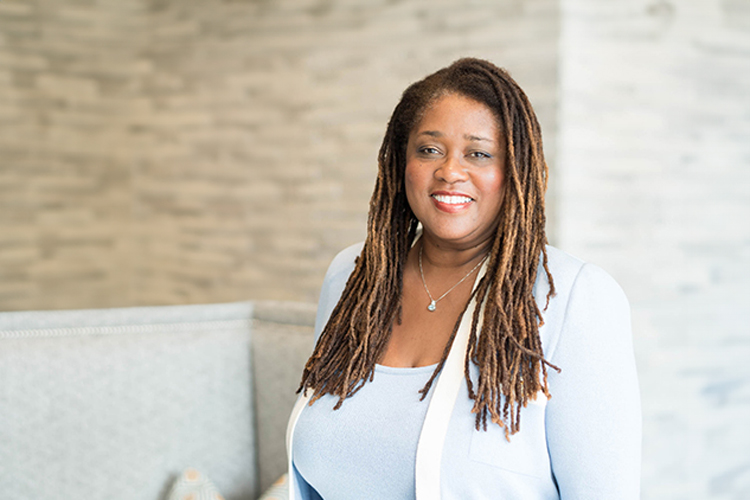Shelley J. Brown Cooper, Ed.D.
Doctor of Education in Instructional Technological Distance Education

I could never a find a program that would work for me. I wanted something that would incorporate my background in technology and education and give me a hands-on practical experience. When I finally found the NSU program, I decided to take the plunge.
Shelley J. Brown Cooper, Ed.D.
Shelley J. Brown Cooper, Ed.D., spent 25 years as a classroom teacher.
Today, Cooper combines her education experience and technology expertise to help children remotely access behavioral health services and improve their school experience using their laptops.
Cooper is the founder of Diversity Telehealth, which provides health care and behavioral therapy services remotely to schools, businesses, and under-served communities.
Cooper earned her Doctor of Education degree at NSU’s Abraham S. Fischler College of Education in 2015, with a concentration in Instructional Technological Distance Education. Here, she discovered the field of telemedicine, which uses telecommunications and information technology to provide health care from a distance.
Her dissertation, “Opinion Leaders’ Perspective of the Benefits and Barriers in Telemedicine: A Grounded Theory Study of Telehealth in the Midwest,” laid the foundation for Cooper to establish Diversity Telehealth, which is based in Kansas City, Missouri, where Cooper resides.
“After being a classroom teacher for 25 years, I wanted to do something different but still be in the realm of helping people,” said Cooper, who taught pre-K through eighth grade as well as computer applications for more than two decades.
For now, Cooper’s focus is on schools. Her company recently completed an eight-week pilot program that allowed children in kindergarten through fourth grade to meet weekly with a behavioral therapist via their laptops.
“With a shortage of school counselors, telemedicine can be a crucial tool to provide behavioral health care to students,” Cooper said. “Kids who were being bullied and the bullies could go about the day using the tools they learned to help them do better in the classroom.”
Cooper also works with employers who want to increase employees’ access to health care, including primary care physicians. Telemedicine also benefits remote and rural communities with limited access to health care specialists.
Cooper credits her business opportunity to her doctoral training at NSU.
“Distance education was the main focus of the program,” she said. “There were rotations that were required to learn more about…providing a service from a distance. Providing health care from a distance was one of the areas we studied.
“I thought telemedicine was something I could do on my own because so many people need it, but I had never heard of telemedicine before the class project. Without that area of study, I never would have thought to enter this field.”
Cooper, a mother of three, has a Master of Arts in Teaching from St. Mary University in Leavenworth, Kansas, and a Bachelor of Science in Business Administration from the University of Missouri-Columbia.
Earning a doctoral degree was always part of her plans.
“I started my doctorate when I was approaching 50,” she said. “It was on my list of goals. But I could never a find a program that would work for me. I wanted something that would incorporate my background in technology and education and give me a hands-on practical experience. When I finally found the NSU program, I decided to take the plunge.”
At NSU, Cooper was able to complete the course work remotely and attend the program’s Summer Conference in Orlando.
“NSU’s program was the most flexible. The summer conferences in Orlando gave me the opportunity to meet face-to-face with the professors and have them look over my work. It was a great assistance for me.
“I always knew I would go into education because I knew there were kids like me who had horrible childhood experiences and I wanted to help them. Being a teacher was the best way for me to do that.
“Even though health care is my company’s main focus, it is still helping children learn how to cope and be successful.”
